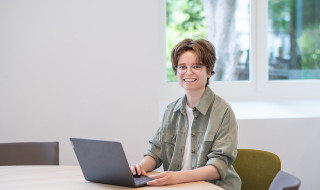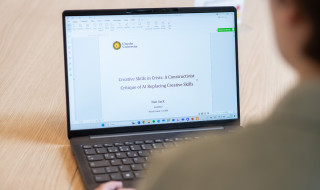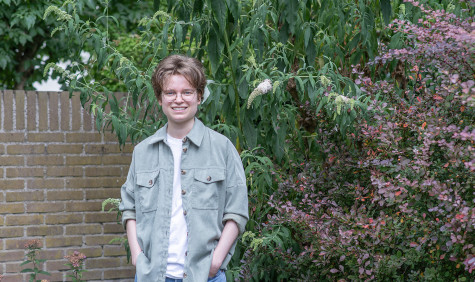Nati Sack: responsible tech
AI could make people more creative
For philosopher and AI researcher Nati Sack, responsible AI is not just a concept to reflect upon. It is a way of doing things, of taking responsibility, and of making conscious decisions. "Developers create what people want."
Nati: "There is momentum. At this point, we can still influence how artificial intelligence develops. A shift is happening, and you can feel it. I am right in the middle of it. This is the moment to do research into artificial intelligence, just as the COVID-19 pandemic was the moment for virologists. I want to be part of the movement that steers AI in the right direction.”

Nati Sack
With a bachelor's degree in Liberal Arts & Sciences (Maastricht University) and a master's in Applied Ethics (Utrecht University), Nati has a strong foundation to discuss the topic. These studies led to work at the Institute of Ethics as a research assistant and intern. In the latter role, Nati co-authored the SURF report 'The Risks of Personalising Higher Education with AI' (2025) with Ben Little.
"I want to be part of the movement that steers AI in the right direction"
Curious about technology
"Let me start by saying that I am not anti-AI. Artificial intelligence offers a lot of opportunities in science, particularly in the medical field. As with many other technologies, the key question is how we use them as humans, and for what purposes. The invention of AI is not like the invention of the firearm. A firearm is inherently harmful, AI is not."
"It starts with teachers themselves developing a good understanding of how to use AI. Many people, and students in particular, are curious and enjoy trying out new technologies: 'the technology exists, so why shouldn't I use it?' That's just how it works."
"Teachers absolutely need to teach their students to engage critically with AI agents. They don’t have to be AI specialists themselves," says Nati. "Regardless of their field, this is something teachers can do. If necessary, with additional training provided by the companies developing AI."
The best possible education
Nati, along with an older sister and a twin sister, was among the first generation in the family to go to college. A good education for the children was the top priority for Nati's parents.
"My father never finished school and became an entrepreneur in carnival trophies and medals. My mother started working as a civil servant right after school. My father in particular, insisted that his children would receive the best possible education. He knew he had missed out on that and experienced it as a shortcoming."
All three siblings went to university. The eldest sister studied marketing and has a successful sales career. Nati's twin sister specialised in sustainability and works in sustainable development & business.

"The creative sector and education are fields that could become victims of AI.”
Causing harm
"My sisters and I are very close and talk to each other a lot. But when I start talking about my own research into responsible AI, there’s always a point where their eyes glaze over."
Still, Nati perseveres. "There are family and friends who work for big tech companies and use a lot of AI. I feel the urge to convince them. They have AI systems linked to their email. They don’t always answer emails themselves anymore; their AI assistant does that for them. It saves time. That can be an advantage. But it can also cause harm. And that’s something they often don’t consider."
Especially for the creative and education sectors, Nati sees risks. "In those fields, it's very much about people, and our humanity. They are fields that could become victims of AI, and where the threat is felt much more strongly than, say, in the medical domain."
Nati began studying and researching in Medical Ethics, but personal circumstances prompted a change of direction. "Over a period of two years, I was sick often and spent a lot of time in hospitals. I started loathing that environment. Now I focus on the creative field, and I am glad I made the change. I see myself as a creative writer and therefore as part of what I am researching. I, too, am influenced by AI. Not that I use it a lot, but I notice a change in myself."

"The devaluation of the creative sphere is the subject I am currently delving into."
Success without hard work
"The devaluation of the creative sphere is the subject I am currently delving into. With the rise of AI, not only are jobs being lost in the creative sector, but the entire essence of creative skills is devaluing." Creatives, for example, may lose agency over their work as they are expected to deliver the work faster by using AI.
What Nati fears most is that the application of AI will eventually lead to us losing a certain meaning in our lives. This is illustrated by the following quote from a prominent tech entrepreneur: 'AI could be the cheat code for a successful life without having to work hard.'
"If that's all we're aiming for, we may not be using technology in the most ethical way."
"Users of AI have their own responsibility for how they use AI and for what"
Responsibility
Nati continues to warn: "Users of AI have a responsibility for how they use AI and for what. Developers move in the direction of user demand, so that is where we can have influence. Companies develop what people want."
"So AI is becoming more skilled, also in creating art. If you look at the first artworks it produced and the ones it is making now, there is a huge progression. But why are we training AI to take over creative tasks?"
This is where Nati sees an alternative use of AI. "Instead of instructing 'create an image' or 'come up with a title', you could prompt 'create a course plan to learn how to draw'. Then AI democratises the arts, because those who don't have enough money for an expensive drawing course can still learn the skills. AI could help us develop skills rather than perform them for us. My hopeful vision for the future is that AI will develop in that direction, because that is what the public wants."
Text: Maureen van Althuis
Photos: Vera Duivenvoorden
